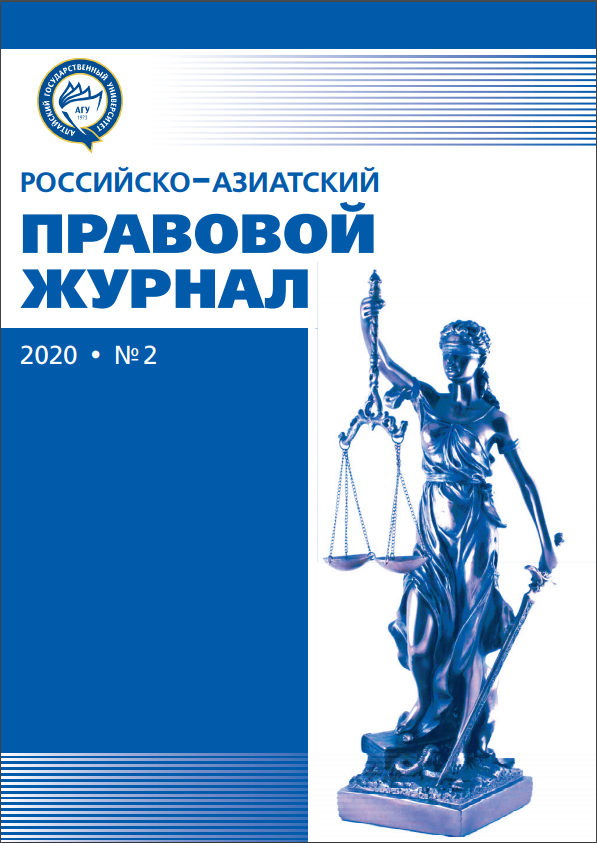LEGAL REGULATION OF INTERNATIONAL COOPERATION OF THE RUSSIAN FEDERATION WITH FOREIGN COUNTRIES IN THE FIELD OF PHYSICAL EDUCATION AND SPORTS
УДК 34:796 ББК 67.93
Abstract
The article studies the national and international legal framework for regulating relations in thefield of physical culture and sports. It has been established that studying and taking into account positiveforeign experience in effectively regulating relations arising in the field of physical culture and sports, forimproving the norms of national sports law, including for codifying the sports legislation of Russia, is oneof the important reasons for the development of international cooperation of the Russian Federation withforeign countries. Another important reason is the need to harmonize and unify the national legislation ofRussia in the field of physical culture and sports with international law. The development of international cooperation between Russia and foreign countries and international organizations in the direction ofensuring national security is especially relevant in the context of exerting pressure on Russian athletes in thepast decade at sports competitions and events of various levels. It is concluded that Russia needs to developall areas of international cooperation, since physical culture and sport at the national and internationallevels is an important tool for ensuring the sustainable socio-economic development of countries, a tool forpersonal development of a person, a tool for intercultural, partnership and friendly development of interstatecommunication and serves as a powerful incentive to increase the competitiveness of each country in thecontext of globalization.
Downloads
References
2. Соловьев А.А. Концепция проекта Спортивного кодекса Российской Федерации. Комиссия по спортивному праву Ассоциации юристов России. М., 2009.
3. Спортивный кодекс Франции. Регламентарная часть — Декреты. Книги I и II. Комиссия по спортивному праву Ассоциации юристов России. М., 2010. Вып. 5.
4. Генеральная Ассамблея ООН отметила важную роль спорта в достижении целей устойчивого развития. URL: https://news.un.org/ru/story/2018/12/1344161 (дата обращения: 30.05.2020).
5. Шевченко О.А. Перспективы и направления развития международно-правового обеспечения спортивно-трудовых отношений в области профессионального спорта // Вестник Российского университета дружбы народов. Серия Юридические науки. 2014. №3. URL: www. cyberleninka.ru. (дата обращения: 30.05.2020).
6. Задорина А.М. Правовое регулирование развития физической культуры и спорта в СНГ как направление укрепления безопасности // Международное сотрудничество Евразийских государств: политика, экономика, право. 2017. №4.
7. Пролетенкова С.Е., Беликов А.П. Проект модельного закона Содружества независимых государств «Об обеспечении безопасности крупных международных и массовых спортивных мероприятий»: основания разработки, перспективы и предложения // Юристъ-Правоведъ. 2016. №5 (78).
8. Каменков В.С. Право о системе спорта в Беларуси, России, Казахстане // Вестник университета им. О.Е. Кутафина. 2015. №4.
9. Гусинец Е.В. Особенности развития отрасли «Физическая культура и спорт» в Республике Беларусь // Экономика и банки. 2019. №1. URL: www. cyberleninka.ru. (дата обращения: 30.05.2020).
10. Яншина Е.Р., Лукичев К.Е. Развитие системы физической культуры и спорта Российской Федерации с учетом основных направлений международного сотрудничества // Вестник спортивной науки. 2017. №6.
11. Лукичев К.Е., Зюрин Э.А., Евсеев А.С., Зембатов Т.Р. Анализ мероприятий, осуществляемых субъектами Российской Федерации, по совершенствованию системы физической культуры и спорта с учетом Стратегии развития отрасли // Вестник спортивной науки. 2017. №5.
12. Лукичев К.Е. Место статического инструментария в механизме государственного управления организациями, осуществляющими спортивную подготовку // Вестник спортивной науки. 2017. №1.
13. Ольховский Р.М. Актуальные вопросы взаимодействия органов государственной власти и некоммерческих общественных организаций для реализации потенциала вовлечения молодежи в спортивную деятельность. URL: www. cyberleninka.ru. (дата обращения: 30.05.2020).
14. Матина З.И. Взгляд в будущее: перспективы развития сферы студенческого спорта и физической культуры //Физическая культура. Спорт. Туризм. Двигательная рекреация. 2016. Т. 1. №4.
15. Алексеев С.В. Спортивное право России. М., 2016.
16. Гостева С.Р. Правовое поле развития физической культуры и спорта в Российской Федерации. URL: www. cyberleninka.ru (дата обращения: 30.05.2020).
17. Алексеев С.В., Бариев М.М., Гостев Г.Р., Гостева С.Р., Саттаров Н.Г. Правовое поле физической культуры и спорта в образовательном пространстве Российской Федерации. Часть 1 // Культура физическая и здоровье. 2018. №3.
18. Иглин А.В. Юридическое понятие спорта // Вестник Омской юридической академии. 2018. Т. 1. №4. С. 388–391.
19. Иванов В.Д., Бардина М.Ю. Правовое регулирование физической культуры и спорта в Российской Федерации // Физическая культура. Спорт. Туризм. Двигательная рекреация. 2019. Т. 4. №2.
20. Иглин А.В. Актуальные проблемы европейского спортивного права // Спорт: экономика, право, управление. 2014. №1.
21. De Dycker S. Good governance in Sport: comparative law aspects // International Sports Law Journal. 2019. №19.
22. Di Marco A. The internal governance of sporting organizations: international convergences on an idea of democracy // International Sports Law Journal. 2019. №19.
23. Siekmann R. C. R., Soek J. Towards a Typology of (International) Comparative Sports Law (Research) // Siekmann R., Soek J. (eds) Lex Sportiva: What is Sports Law? ASSER International Sports Law Series. T.M. C. Asser Press, 2012.
24. Van Kleef R. The legal status of disciplinary regulations in sport // International Sports Law Journal. 2014. №14.
Russian-Asian Law Journal is a golden publisher, as we allow self-archiving, but most importantly we are fully transparent about your rights.
Authors may present and discuss their findings ahead of publication: at scientific conferences, on preprint servers, in public databases, and in blogs, wikis, tweets, and other informal communication channels.
Russian-Asian Law Journal allows authors to deposit manuscripts (currently under review or those for intended submission) in non-commercial, pre-print servers such as ArXiv.
Authors who publish with this journal agree to the following terms:
- Authors retain copyright and grant the journal right of first publication with the work simultaneously licensed under a Creative Commons Attribution License that allows others to share the work with an acknowledgement of the work's authorship and initial publication in this journal.
- Authors are able to enter into separate, additional contractual arrangements for the non-exclusive distribution of the journal's published version of the work (e.g., post it to an institutional repository or publish it in a book), with an acknowledgement of its initial publication in this journal.
- Authors are permitted and encouraged to post their work online (e.g., in institutional repositories or on their website) prior to and during the submission process, as it can lead to productive exchanges, as well as earlier and greater citation of published work (See The Effect of Open Access).








